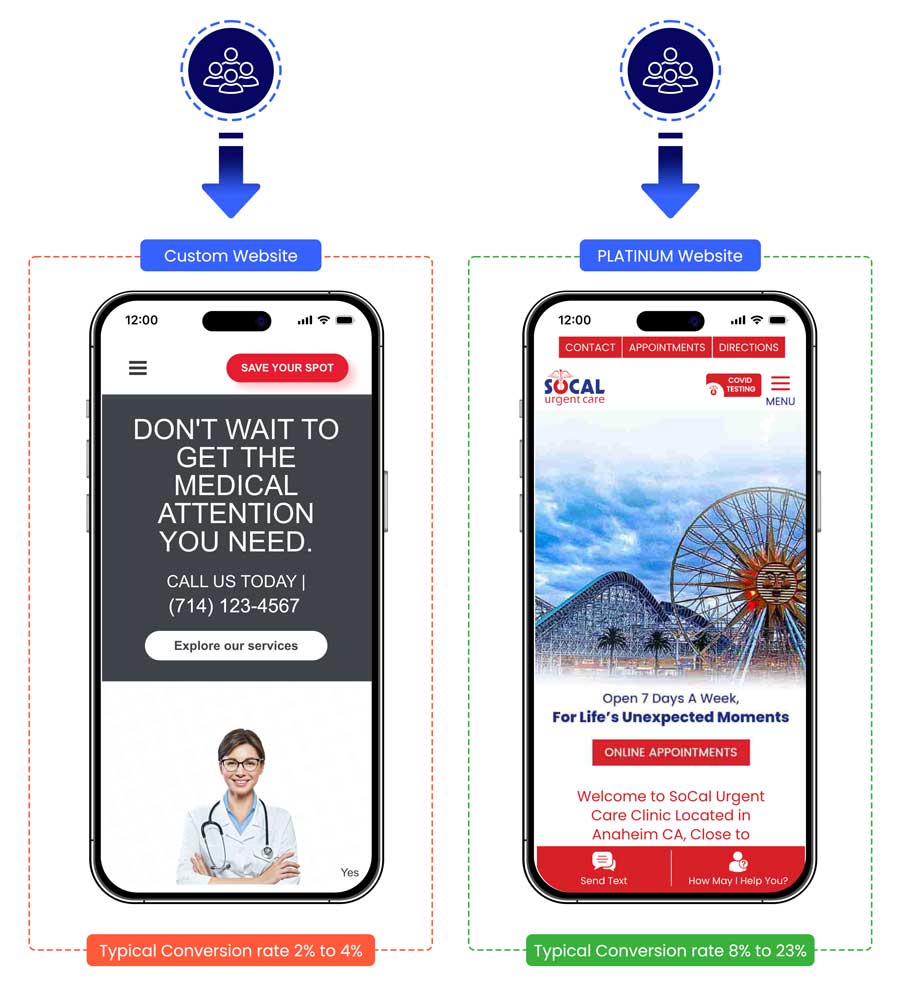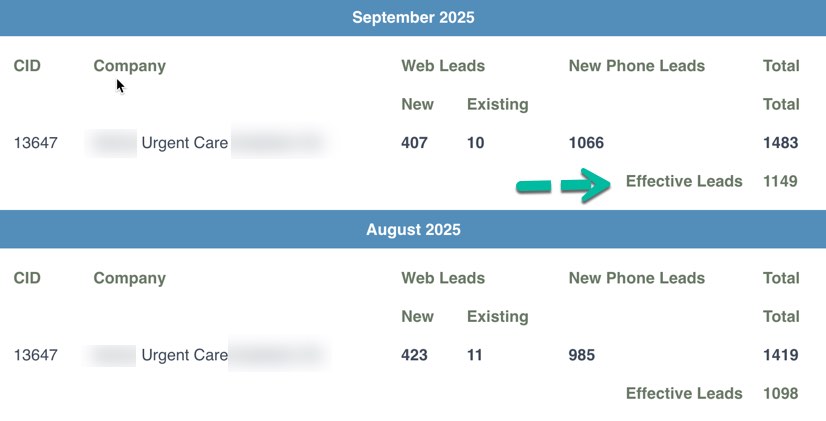HIPAA Compliant Website Builders for Doctors Practices & Dental Practices in US
PatientGain.com is HIPAA-compliant website builder for medical and dental practices. We provide our standard BAA, offering various services and apps designed to handle protected health information (PHI) securely. All of our staff receive regular training on security and HIPAA best practices. We use AWS HIPAA Compliant Platform. Our apps have role based access. All websites used for PLATINUM customers are also A/B tested for high conversion rates. Consent management app is also included to comply with all patient consents.

- CRM and Software: PatientGain’s Customer Relationship Manager (CRM) and software are designed to store patient information securely and in accordance with HIPAA guidelines, utilizing integrated security protocols and best data handling practices.
- Apps: PatientGain’s apps for healthcare clinics save PHI on secure servers that meet HIPAA guidelines, and they implement role-based access for all users.
- SSL/TLS certificate: In practice, a website that collects, stores, or transmits ePHI without an SSL/TLS certificate (and thus runs on unencrypted HTTP) would almost certainly be found to be in violation of HIPAA’s security standards.
- Business Associate Agreement (BAA): PatientGain provides standard BAAs for its customers, but customers who do not comply with HIPAA guidelines will not have BAA protection. Custom BAA is offered for those customers who are on our CUSTOM services. CUSTOM services are much more expensive than subscription based services, such as PLATINUM monthly service.
- Specific Services:
- Medical Marketing Websites: PatientGain offers HIPAA-compliant websites for healthcare practices. No patient information is stored in website database tables.
- Patient Forms: They provide HIPAA-compliant web forms for doctors and dentists.
- Digital Marketing: PatientGain offers HIPAA-compliant digital marketing services.
- Patient Engagement Platform: Their Silver Service is a HIPAA-compliant digital patient engagement platform.
- WordPress Hosting: PatientGain offers HIPAA-compliant WordPress hosting for clinics and doctors.
- Apps on AWS: PatientGain apps are hosted and run on Amazon Web Services (AWS).
- Patient Satisfaction Surveys: They offer HIPAA-compliant patient satisfaction surveys.
- Marketing Automation: PatientGain is a medical and dental marketing automation platform based on AI agents, apps and services. AI agents are used however a human checks the results.

Read more about how HIPAA and Secure architecture is implemented here. While Silicon Valley, California is home for PatientGain.com headquarters, the company employs a diverse and talented team across the USA, Canada and Asia. Our main office is located in Carmel CA. Our servers and data centers are HIPAA compliant and are handled by Amazon HIPAA Compliance. You can read more here: https://aws.amazon.com/compliance/hipaa-compliance
PatientGain works with AWS and WordPress to maintain HIPAA compliance for healthcare websites and applications by implementing various security measures and adherence to HIPAA requirements
1. Leveraging AWS for Secure Hosting and Applications:
- AWS Infrastructure: PatientGain utilizes Amazon Web Services (AWS) as their hosting provider, ensuring their servers adhere to HIPAA and HITECH laws. AWS provides a secure cloud computing environment designed to meet the stringent requirements of healthcare data security.
- Secure Apps: PatientGain’s apps, including their CRM and other patient engagement tools, are hosted and run on AWS, ensuring that Protected Health Information (PHI) is stored securely and in accordance with HIPAA guidelines.
2. Ensuring HIPAA Compliance within WordPress:
- No PHI Stored in Website Database: PatientGain ensures that no patient information is stored in the WordPress website database tables themselves, minimizing risk associated with the core WordPress platform. This is crucial because standard WordPress itself is not inherently HIPAA compliant.
- Secure Forms and Data Handling: They offer HIPAA-compliant web forms and use best data handling practices to maintain HIPAA compliance, employing integrated security protocols. Actual data is never stored in WordPress. It is stored in AWS secure servers. We also use Google cloud HIPAA storage also ( for redundancy )
- Access Controls: PatientGain implements role-based access for all users, restricting access to PHI based on their job functions. This ensures only authorized personnel can access sensitive information. All staff members are back ground checked.
- Business Associate Agreement (BAA): PatientGain provides standard BAAs for its customers, which are essential legal documents outlining responsibilities for protecting PHI when working with third-party vendors.
3. Internal Compliance Measures:
- Staff Training: PatientGain provides regular training to its staff on security and protecting patient information, which is a key component of HIPAA compliance.
- Security Log Reviews and Audits: PatientGain reviews security logs and implements other administrative safeguards to monitor and protect against unauthorized access. They also perform regular self-audits and remediation plans to address risks and vulnerabilities.
In summary, PatientGain combines the secure infrastructure of AWS with specific configurations and best practices applied to WordPress to create a HIPAA-compliant environment for its healthcare clients. They achieve this by carefully managing where PHI is stored and ensuring strong security measures are in place at all levels.
In summary, PatientGain implements a multi-layered approach to ensure HIPAA compliance for its healthcare websites and applications. This involves utilizing AWS for secure infrastructure, implementing specific security measures within their WordPress platform, and conducting regular internal audits and staff training.
How To Become HIPAA Compliant – Medical Websites for Doctors. Is My Website HIPAA Compliant?
As a medical provider or a healthcare office manager, or an administrator, you have several options.
1) Using many tools and apps available, you can embark on the trial and error journey to build your own medical, dental, healthcare focused HIPAA compliant website. Pros : 1) Personal satisfaction 2) Low cost Cons : 1) Wasted time, effort 2) Results are likely to be sub-optimal 3) May not be HIPAA compliant
2) Hire a freelancer to provide basic components of a nice looking medical, dental, healthcare website. Next you will need to worry about HIPAA compliance, or lack thereof. Pros : 1) Low cost Cons : 1) Incomplete medical marketing strategy 2) Results are likely to be sub-optimal 3) May not be HIPAA compliant
3) Hire a professional medical marketing company. These companies are professionals and they only focus on medical, dental, healthcare websites. Once the website is completed, you will need to make sure that BAA is issued and HIPAA compliance is covered. You will still need additional apps to complete your marketing strategy. Pros : 1) Website will look professional 2) will probably will have SEO 3) will probably will have excellent conversion 4) Support is provided when need it the most Cons : 1) Cost is usually $3500 to $6000 for setup of a professional healthcare website 2) Monthly maintenance and support is extra cost 3) Apps are not included 4) Conversion tracking software are not included, like CRM 5) May not be HIPAA compliant. 6) May not be A/B tested 7) Social media, Email marketing, SMS/Texting is usually extra cost.
4) Use PatientGain’s GOLD monthly service. There are no upfront costs. Gold service is fully integrated new patient marketing solution with google SEO optimized website. Costs $799/mon – $1399/mon with superior customer happiness. Used by hundreds of dental and medical practices in usa & canada. Conversion & SEO focused A/B tested website, quality content, your custom branding, apps, social media, email marketing, texting/sms, awesome customer service, hipaa compliant crm & modern features included in the gold service. Medical marketing apps and algorithms from PatientGain leverage machine learning, data mining and artificial intelligence to score conversion rates of your leads. This enables us to add useful, valuable content to your medical website.
A HIPAA-compliant website builder for healthcare ensures that your website adheres to the stringent privacy and security requirements set forth by the Health Insurance Portability and Accountability Act (HIPAA). These website builders are specifically designed to protect sensitive patient information and facilitate secure online interactions between healthcare providers and patients. Here’s an overview of what a HIPAA-compliant website builder does:
Table of Contents:
- Key Features and Functions of a HIPAA Compliant Website Builder
- Benefits of Using a HIPAA Compliant Website Builder
- Choosing a HIPAA Compliant Website Builder
- Common Challenges and Considerations
- Best Practices for TCPA Compliance
- Conclusion
Key Features and Functions of a HIPAA Compliant Website Builder
- Data Encryption:
- Protects patient information by encrypting data both at rest and in transit, ensuring that sensitive information is secure.
- Secure Sockets Layer (SSL):
- Ensures secure communication between the website and visitors, protecting data from being intercepted by unauthorized parties.
- Access Controls:
- Limits access to patient data to authorized personnel only, employing multi-factor authentication and role-based access controls to safeguard information.
- Audit Trails:
- Tracks user activity on the website to identify potential security breaches and maintain detailed logs of all activities for compliance monitoring.
- Business Associate Agreements (BAAs):
- Provides legal protection for healthcare providers by requiring website builders to sign BAAs, ensuring they adhere to HIPAA regulations.
- HIPAA-Compliant Apps & Forms:
- Offers secure forms for collecting patient information, such as appointment requests, medical history, and intake forms, ensuring the data is encrypted and protected.
- Patient Portals:
- Enables secure patient access to their health records, appointment information, and communication with healthcare providers through an integrated patient portal.
- Compliance Support:
- Provides resources and guidance to help healthcare providers maintain HIPAA compliance, including regular security audits and updates.
- Secure Hosting:
- Provides secure hosting environments with advanced firewalls, intrusion detection systems, and regular security audits to protect patient data.
- Data Storage and Backup:
- Ensures that patient data is stored securely and backed up regularly to prevent data loss and facilitate recovery in case of a breach or technical failure.
- Third-Party Integrations:
- Supports integration with third-party applications, such as electronic health records (EHR) systems, telehealth platforms, and payment gateways, while ensuring that these integrations are HIPAA-compliant.
Benefits of Using a HIPAA Compliant Website Builder
- Protect Patient Privacy:
- Safeguards sensitive patient information from unauthorized access and breaches.
- Maintain Compliance:
- Ensures that your website meets all HIPAA requirements, reducing the risk of non-compliance penalties and legal issues.
- Enhance Patient Experience:
- Offers secure online services such as appointment scheduling, patient portals, and secure communication channels, improving patient satisfaction and engagement.
- Build Trust:
- Demonstrates a commitment to patient privacy and security, building trust with patients by ensuring their information is protected.
Choosing a HIPAA Compliant Website Builder
When selecting a HIPAA-compliant website builder for your healthcare practice, consider the following factors:
- Security Features:
- Ensure the builder offers robust security features, including encryption, secure hosting, SSL, and access controls.
- Compliance Support:
- Look for builders that provide support for HIPAA compliance, including BAAs, audit trails, and regular security audits.
- Ease of Use:
- Choose a builder with an intuitive content management system (CMS) that allows you to manage website content easily.
- Integration Capabilities:
- Ensure the builder supports integration with your existing systems, such as EHR and telehealth platforms.
- Customer Support:
- Opt for a provider that offers reliable customer support to assist with any technical or compliance issues.
Common Challenges and Considerations
- Defining Healthcare-Related:
- Determining what constitutes a healthcare-related message can be complex.
- Patient Consent:
- While not required for healthcare-related communications, obtaining explicit consent for marketing or non-treatment-related messages is essential.
- Automated Systems:
- Using autodialers or prerecorded messages for healthcare-related calls might still require specific exemptions or consent.
- Text Messaging:
- While convenient, text messaging can pose challenges related to message length, content, and documentation.
- HIPAA compliance of Facebook IG, Meta Pixels:
- Facebook, IG, Meta Pixels is not HIPAA compliant.
- There is no BAA issued by Facebook, IG, Meta Pixels.
- HIPAA compliance of Google Analytics:
- According to Google, customers must refrain from using Google Analytics in any way that may create obligations under HIPAA for Google. HIPAA-regulated entities using Google Analytics must refrain from exposing to Google any data that may be considered Protected Health Information (PHI), even if not expressly described as PII in Google’s contracts and policies. Google makes no representations that Google Analytics satisfies HIPAA requirements and does not offer Business Associate Agreements in connection with this service.
Best Practices for TCPA Compliance
- Develop Clear Communication Policies:
- Define what constitutes healthcare-related communication and establish guidelines for patient interactions.
- Document Consent:
- Even for healthcare-related communications, consider documenting patient consent to build a stronger compliance posture.
- Train Staff:
- Ensure employees understand TCPA and HIPAA regulations to avoid violations.
- Monitor and Review:
- Regularly review communication practices to identify potential risks and areas for improvement.
Results from HIPAA compliant website & conversion optimizations using PLATINUM Service
Based on the marketing performance dashboard, in the month of September, there are 1149 effective leads. These new patient leads are from the PLATINUM service based HIPAA compliant website. This website is heavily optimized for SEO and conversions.

Conclusion
A HIPAA-compliant website builder is essential for healthcare providers looking to create a secure, user-friendly, and compliant online presence. By leveraging these specialized tools, medical practices can protect patient information, ensure compliance with HIPAA regulations, and improve overall patient engagement and satisfaction. Utilizing a HIPAA-compliant website builder helps healthcare providers avoid costly penalties, enhance the patient experience, and build trust by demonstrating a commitment to patient privacy and security.
PatientGain.com customers can request a Business Associate Agreement (BAA) before using PatientGain.com services that handle PHI. PatientGain.com offers a BAA covering selected PatientGain.com apps. Our customers are responsible for determining whether they are subject to HIPAA requirements and whether they use or intend to use PatientGain.com Apps in connection with their PHI. Customers who have not entered into a BAA with PatientGain.com must NOT use PatientGain.com services in connection with PHI. Details of HIPAA rules and safeguards can be found here. http://www.hhs.gov/ocr/privacy/
PatientGain.com websites and data stores run on secure high performance servers located in the USA. All PHI information is stored in compliance with HIPAA guidelines. Contact us for more details.
If you have a medical website and potential patients or existing patients communicate with you using the website to call you, send Emails or send forms, you are likely receiving patient information that may include PHI.
If you have been audited for a HIPAA violation, you may be asked to provide a Business Associate Agreements (BAA) from all vendors, including your website provider, who may have transported, viewed, stored, or handled PHI. As a clinic business owner it is your responsibility to address BAA requirements from all providers of services to your medical practice.
PatientGain.com provides BAA for its customers. In order to understand what is covered, let’s review four major areas of HIPAA regulations and some definitions.
What is a Covered Entity: In HIPAA legal language, a Covered Entity is the medical practice providing services to patients. This would mean your clinic or medical facility.
What is a Business Associate: A Business Associate is a service provider or vendor that provides services, technology, websites, software, etc. to the Covered Entity.
What is a Business Associate Agreement (BAA): A BAA is a legal document provided to your clinic, that states in detail that the Business Associate has taken necessary steps, in accordance with HIPAA regulations, to provide security and other measures to protect PHI.
It is important to note that Covered Entities and their Business Associates need to protect the privacy and security of Protected Health Information (PHI). But, it gets more complicated when you start to put together a to-do list. Covered entities are required to apply the appropriate administrative, technical, and physical safeguards to protect the privacy of protected health information. This applies to all forms of protected health information. As such, covered entities are not permitted to abandon PHI or dispose of such information so that it would be accessible to the public or unauthorized individuals. Covered Entities are required to train their workforce on the proper disposal of PHI. It is important to note that under federal standards, the “workforce” includes volunteers. Covered entities should also determine what steps are required to dispose of Protected Health Information while complying with HIPAA Privacy and Security Rules.
There are four key rules:
1. HIPAA Privacy Rule
2. HIPAA Security Rule
3. HIPAA Enforcement Rule
4. HIPAA Breach Notification Rule
As far as action items are concerned, you need to follow the HIPAA Privacy Rule and the HIPAA Security Rule. You also need to provide notification following a breach of unsecured protected health information according to the Breach Notification Rule. This article is not a definitive list of what is required for HIPAA compliance, you should assign a Privacy Officer to review each rule in its entirety. This article is intended to point you in the right direction. PatientGain.com will provide BAA for your clinic, if requested.
PatientGain.com apps for healthcare clinics save the PHI information in secure servers that meet HIPAA guidelines.
